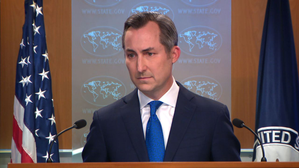America
'In response to Russia's advances in eastern Ukraine, US decided to supply anti-personnel landmines': Matthew Miller

Washington DC, November 21:
The United States on Wednesday confirmed that it will provide Ukraine with non-persistent anti-personnel landmines to aid in the country's defence against Russian attacks. The US State Department spokesperson Matthew Miller said that the decision to provide anti-personnel landmines is a response to Russia's military advances in eastern Ukraine.
Notably, there were news reports that US President Joe Biden authorised the provision of anti-personnel landmines to Ukraine.
Addressing the US State Department press briefing on Wednesday, Miller said, "So I can confirm that we are providing the Ukrainian government with non-persistent anti-personnel landmines. We have been providing them with anti-tank landmines for some time, but this is the first time we are providing them with anti-personnel landmines."
He added, "There are a few things that I think are important to note about this new provision of equipment to the Ukrainians. One is that, as you have heard the Secretary say many times, we always adapt and adjust our policies based on real-world events. And the real-world events that we have seen are Russian advances, specifically Russian infantry advances in eastern Ukraine, and these non-persistent anti-personnel landmines are designed to blunt those types of infantry advances. They are very different from the landmines that the Russians have deployed and that you have seen other militaries, including our own military, deploy decades ago."
He further said that the Russians have deployed in Ukraine around two million landmines which will remain a threat for decades, and can go off at any time, and harm not just soldiers but civilians as well. Elaborating more on the non-persistent landmines, Miller emphasised that the landmines will not pose a threat to the civilian population. He said, "These landmines that we have provided are non-persistent landmines. And what that means is they are battery-powered. The battery will expire somewhere between four hours and two weeks - at the most, two weeks from when they are deployed. So the landmines will be deployed, and then within two weeks, if they have not been detonated, they become inert. So they will not pose a threat to the civilian population at the end of the conflict."
Meanwhile, Amnesty International, an international NGO, critisised the decision to provide Ukraine with the anti-personnel landmines and condemned President Biden for making "consequential and dangerous decision." Ben Linden, Advocacy Director for Europe and Central Asia for Amnesty International US, stated, "This is a reckless decision and a deeply disappointing setback for a President who once agreed that landmines put more civilians at increased risk of harm. It is devastating, and frankly shocking, that President Biden made such a consequential and dangerous decision just before his public service legacy is sealed for the history books."
Linden added, "Anti-personnel landmines are inherently indiscriminate weapons that maim and kill civilians long after conflicts end and shouldn't have a place in the arsenal of any country. Even the 'non-persistent' mines are a threat to civilians. In the face of continued Russian aggression, including the killing and injuring of Ukrainian children, landmines are not the answer to keep civilians safe."
Notably, landmines come predominantly in two varieties: anti-personnel and anti-vehicle mines. Both have caused great suffering in the past decades and continue to kill and injure civilians and by-standers long after conflicts have ended. Anti-personnel mines are prohibited under the Ottawa Convention, as per the United Nations Office for Disarmament Affairs.
Since its inception more than two decades ago, the Anti-Personnel Landmines Convention has led to a virtual halt in global production of anti-personnel mines, and a drastic reduction in their deployment. More than 40 million stockpiled mines have been destroyed, and assistance has been provided to survivors and populations living in the affected areas.
The International Committee of the Red Cross (ICRC) says that anti-personnel mines leave a long-lasting legacy of death, injury and suffering. Stepping on a mine will often injure or kill one or more people - frequently children. Mine contamination makes it impossible to use vast areas of land, compromising food production and destroying livelihoods. The impact of anti-personnel mines on communities often lasts for decades.
That is why in 1997 the international community adopted the Anti-Personnel Mine Ban Convention, which prohibits the use, production, stockpiling and transfer of these weapons and requires action be taken to prevent and address their long-term effects. Notably, more than three-quarters of the world's countries have now joined the Anti-Personnel Mine Ban Convention. The new use of mines by states, even those not party to the Convention, is rare.
Source: ANI



































